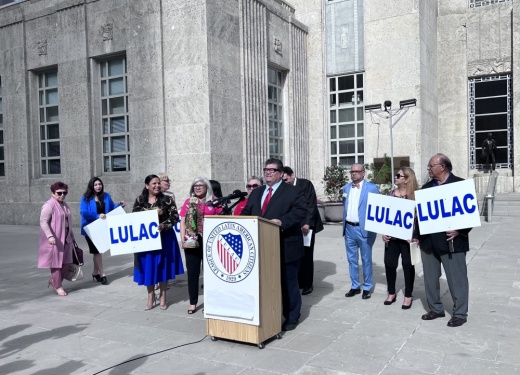The League of United Latin American Citizens is calling on the city of Houston to eliminate at-large seats on Houston City Council as the city begins to focus on redistricting, a move officials said would lead to better representation for the city's Latino residents.
Houston City Council is made up of 16 members, including five at-large members and 11 district members, who are elected to represent specific geographic parts of the city. According to the most recent census data, 45% of the population in Houston is Hispanic. Right now, District I Council Member Robert Gallegos is the only Hispanic member on the council.
LULAC National President Domingo Garcia created a redistricting task force committee to fight for council having only single-member districts and equal representation for Hispanics in the city. Through this task force, LULAC officials said they hope to see equitable representation for Hispanics on the council.
“What we need is a strategy and plan of action,” Garcia said during a March 28 town hall meeting in Houston. “It’s time that Houston got on the same mat as everybody else in Texas.”
In order to move from at-large districts to single-member districts, Houston's city charter will have to be amended, a process that can be done either through a vote from Houston City Council or through a petition that could put the item before voters during an upcoming election.
In a phone interview with Community Impact Newspaper, Sergio Lira—co-chair of the redistricting task force and president of LULAC Greater Houston Council No. 4967—said LULAC will hold a petition drive during the November election. During this time, LULAC will need to gather a minimum of 20,000 signatures in order to have the petition verified so it can be placed on the ballot for voters, Lira said.
Along with the petition, the task force is planning a lawsuit against the city of Houston. Lira said Garcia and his attorneys will initiate the lawsuit, adding that it could be filed by the end of May.
“We're looking at within maybe a year or two-year timeline in terms of these outcomes to be positive for our community,” Lira said. “It's a long haul. We must not get deterred, and we must continue on the course and continue to work for our community to have equitable representation.”
Houston City Council kicked off the redistricting process March 2 when it hired a law firm to help draw new lines ahead of the 2023 election. New lines will be based on data from the U.S. census released in 2020.
Mark Jones, a professor of political science with Rice University, was among the speakers at LULAC's March 28 town hall meeting. He said there is a downside to waiting until 2023 to ask voters to eliminate at-large districts. If the vote passes in that election, changes would not be seen until 2027, when council districts are redrawn again.
According to data provided by LULAC, Houston is the outlier in Texas when it comes to at-large districts. San Antonio, Dallas, Austin, Fort Worth and El Paso all have only single-member districts. Lira said those cities also saw an immediate shift in better representation in the elections that took place once solely single-member districts were implemented.
“I think Austin is the most reflective of the demographics,” Lira said. “They have three Latino City Council members, and the population in Austin is about 30% Latino, so that's pretty much parity.”
Since the Hispanic representation on the council is not in alignment with the overall representation in the Houston community, their needs are not being reflected, especially when it comes to the budget, said Jeronimo Cortina, a political science professor with the University of Houston and the associate director of the Center for Mexican Studies. However, he said the Latino community needs to hold itself accountable, too.
“We need to register; we need to vote; we need to show that we mean business,” Cortina said at the March 28 town hall. “It is our fault that we don’t have a lot of candidates winning.”
This fight is one Houston has been dealing with since the 1970s, Lira said.
“This is just an issue of fairness for everyone in our community based on the census data,” Lira said. “Whether they're documented or undocumented, they all deserve representation and medical resources.”





